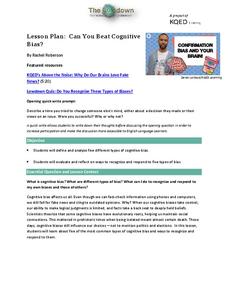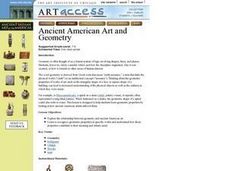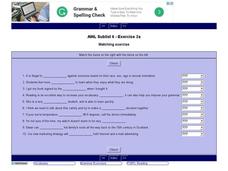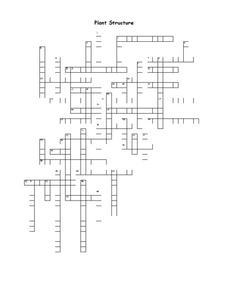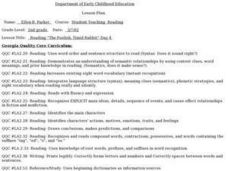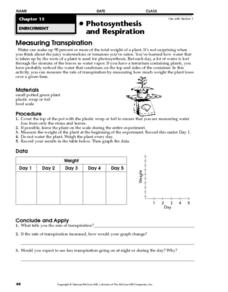Inside Mathematics
Quadratic (2009)
Functions require an input in order to get an output, which explains why the answer always has at least two parts. After only three multi-part questions, the teacher can analyze pupils' strengths and weaknesses when it comes to...
University of Minnesota
Beautiful Brain: Do You See What I See?
Can art play tricks on your eyes, and can a still painting really appear to vibrate? The second lesson in a four-part series discusses the way our beautiful brains translate visual images. It highlights the style of optical art and...
University of Minnesota
Beautiful Brain: Step Inside the Brain
Before digital microscopes, scientists hired artists to draw the things visible in the microscope. Through training in neuroscience and art, Cajal revolutionized the way we view the beautiful brain. The third instructional activity in a...
University of Minnesota
Beautiful Brain: Brain Inspiration
"Neuroscientists consider Cajal as important to their discipline as Einstein is to physics." The first of four lessons has scholars view Santiago Ramon y Cajal's drawings of neurons. They reflect and respond to the art through writing...
NPR
Can You Beat Cognitive Bias?
In a time of fake news, media manipulation, and Internet trolls, a resource equips learners with the tools they need to recognize and combat resources that are designed to appeal to our cognitive biases. Introduce learners to five...
NPR
Is There Really an Immigration Line?
If you've ever looked at the US immigration system, you know that it is complex and a source of controversy. An insightful lesson plan encourages learners to conduct their own analyses of the US immigration system by asking them to...
Curated OER
Amazon Water Cycle Role Play
Students participate in a role play where they play clouds, the ocean, rain drops, and more in order to learn about the water cycle. For this water cycle lesson plan, students have discussions and learn vocabulary.
Curated OER
Soil Nutrients - Phosphorus Lab Lesson Plan
Students list sources of phosphorus in soil. They explain how phosphorus is removed from the soil and used by plants. Students list the symptoms of insufficient or excess phosphorus. Students perform experiments to examine the effect of...
Curated OER
Ancient American Art and Geometry
Students explore the relationship between geometry and ancient American art. They see how to recognize geometric properties in specific works and explain how these properties contribute to their meaning and artistic merit.
Curated OER
Anticipation Guide Heart of Darkness
The whys and wherefores of anticipation guides are detailed in a resource that models how to craft statements for this reading strategy.
Curated OER
American Focus on World Constitutions
Upper graders read several passages to gain an understanding of the nations that have adopted a constitution similar to the United States Constitution. This is a scripted instructional activity that is intended to build content-specific...
Curated OER
American Focus on World Constitutions
Eighth graders describe essential components of a constitution and cite cultural factors affecting international law-making.
Curated OER
English Vocabulary Skills: AWL Sublist 6 - Exercise 2a
In this online interactive English vocabulary skills worksheet, students answer 10 matching questions which require them to fill in the blanks in 10 sentences. Students may submit their answers to be scored.
Curated OER
Functions of Leaves
The title is a little deceiving since only one of 17 slides is dedicated to the function of leaves, while the rest is dedicated to the structure. Both internal and external structure is taught with accompanying diagrams. If you are going...
Curated OER
Plant Structure
In this plant science learning exercise, learners complete a crossword puzzle with 48 questions. They identify the different parts of a plant.
Curated OER
Plant Parts
In this plant parts learning exercise, students read for information and demonstrate comprehension. In this true and false, fill in the blank, short answer, and multiple choice learning exercise, students answer ten questions.
Curated OER
Auxin: Indole-3-Acetic Acid
Learners identify auxins from their structural formulas. They understand the process of refluxing in chemical synthesis. Students perform thin layer chromatography using silica gel plates to differentiate chemical substances.
Curated OER
Special Protections-Session Six
Parents and children work together in a community circle to discuss caring for people with special needs. In separate groups, the children sing and listen to a story. They discuss ways people are alike, and ways they are different....
Curated OER
Forces in the Sport of Luging
Students discuss force, gravity, and friction as well as examples of each based on what they viewed during a Discovery video. They examine first hand the effect of forces by building their own luge track, making predictions, and testing...
Curated OER
Language Arts: Plotting Stories
Second graders read the story, "The Foolish, Timid Rabbit," as part of a unit on appearances. After reading with partners, they write their own stories that include elements about some forms of matter from their science studies. Students...
Curated OER
Global Warming: Life in a Greenhouse
High schoolers examine the evidence that scientists have used to support the existence of global warming and the greenhouse effect. How the concepts have been developed and evaluated form the focus of this lesson.
Curated OER
Measuring Transpiration
In this transpiration worksheet, students will conduct an experiment to measure the rate of transpiration from a plant by measuring how much weight the plant loses over 5 days. Students will record their data and create a graph of the...
Curated OER
Ancient Greece: Athens as a City State
Sixth graders find Greece on the map and recognize how the geography of Greece was important in its development. In this ancient Greece lesson, 6th graders research Greece and compare to the civilization of ancient Egypt. Students answer...
Curated OER
The Rise of the City States in Greece
Sixth graders examine Ancient Greece and its development of democracy. In this Greek History lesson, 6th graders explore the rise of city-states in Greece and its overall effect on the development of democracy. The class continues with...




